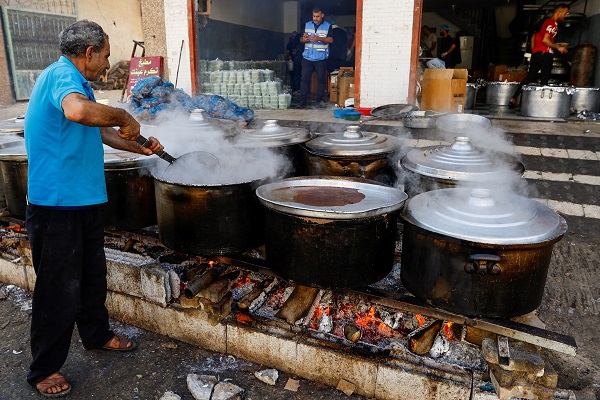 Palestinians cook on firewood, amid fuel and cooking gas shortages, as the conflict between Israel and Hamas continues, in Khan Younis in the southern Gaza Strip, 5 November 2023;
Credit: Reuters/Ibraheem Abu Mustafa/File Photo
Palestinians cook on firewood, amid fuel and cooking gas shortages, as the conflict between Israel and Hamas continues, in Khan Younis in the southern Gaza Strip, 5 November 2023;
Credit: Reuters/Ibraheem Abu Mustafa/File Photo
JERUSALEM/WASHINGTON (Reuters) - Israel's war cabinet has agreed to allow 140,000 litres of fuel into Gaza every two days after a request from Washington, amid acute shortages that threatened aid deliveries and communications in the besieged strip, Israel and US officials said on Friday 17 November 2023.
Israel imposed a strict blockade on all goods entering Hamas-controlled Gaza when it launched a military campaign in response to the Palestinian militant group's rampage on 7 October 2023, in which its fighters killed 1,200 people and took 240 hostages.
Israel has since agreed to allow in aid trucks after stringent inspections, and a small amount of fuel was allowed in on Wednesday to keep United Nations Relief and Works Agency (UNRWA) aid delivery trucks moving.
An Israeli official who declined to be identified said two trucks a day would be allowed in to meet the UN's needs, but said the amount would give "minimal" support for water, sewage and sanitary systems in Gaza to prevent pandemics.
A US State Department official, offering more details, said Israel had committed to allowing in 120,000 litres of fuel every 48 hours for UNRWA's trucks and other needs like desalinisation of water, sewage pumping, bakeries and hospitals in the south of Gaza.
An additional 20,000 litres every two days would be allowed in to power generators of telecoms company Paltel, which had warned of an imminent blackout of its mobile phone network due to lack of fuel.
The agreement to deliver the fuel drew strong opposition from some members of Prime Minister Benjamin Netanyahu's right-wing coalition but it followed increasing international alarm at the dire humanitarian situation in Gaza.
US officials have been pushing Israel to allow fuel in for some time. But Secretary of State Antony Blinken made calls to members of Israel's war cabinet on Wednesday 15 November 2023 and warned that the fuel shortage risked a humanitarian catastrophe among Gaza's 2.3 million residents, the State Department official said.
Israeli officials had previously argued that Hamas should release hostages before it eased the pressure on Gaza, the official said, adding that negotiations on the release of hostages continue separate from the move on fuel.
Finance Minister Bezalel Smotrich, who heads one of the nationalist-religious parties in Netanyahu's coalition said the decision to allow in fuel was a serious mistake
"It conveys weakness, it gives oxygen into the enemy," he said in a statement.
The Israeli official confirmed the decision came after a request from Washington, and said allowing the fuel in gives Israel extra room to maneuver in the international arena so it can continue its campaign to eradicate Hamas in Gaza.








